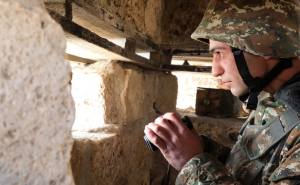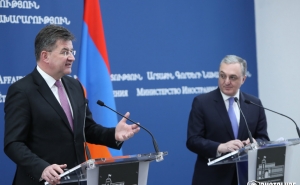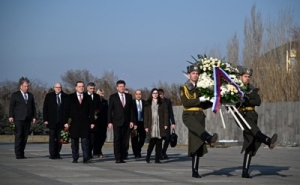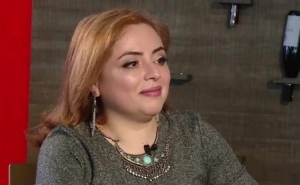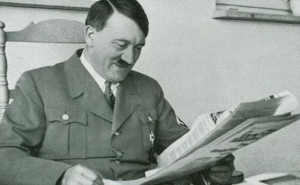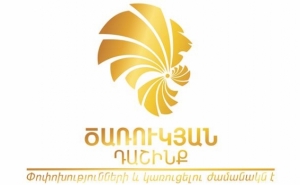Congress-People's Party of Armenia Alliance and Their Foreign Policy Priorities: Interview with Arman Musinyan (EXCLUSIVE)
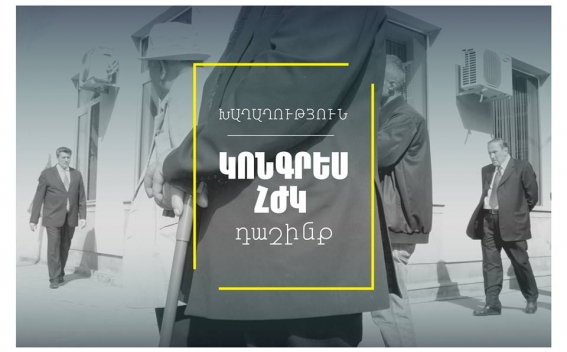
Parliamentary elections are also a choice of the foreign policy course of the country. One of the priorities of "Armedia" IAA is the coverage and analysis of the foreign policy of the Republic of Armenia. On the eve of parliamentary elections scheduled for April 2, "Armedia" IAA conducts interviews with the representatives of all nine political forces giving them the same questions, which will allow our readers to better understand the approaches of the political forces regarding the foreign policy priorities of Armenia.
"Armedia’’ IAA presents an exclusive interview with the member of the Alliance "Congress-People's Party of Armenia", the speaker of the "Armenian National Congress" party Arman Musinyan.
- Mr. Musinyan, will you, please, name the three main priorities of the foreign policy directions of your political power?
- The first is the settlement of the Artsakh conflict, the second is the settlement of the Artsakh conflict, and the third is the settlement of the Artsakh conflict. The only super-task facing Armenia today is the settlement of the Artsakh conflict. And this is the foreign policy issue. If the Artsakh conflict is resolved, the 95% of the so-called complications of Armenia's foreign policy disappears.
- What is your position on Karabakh conflict settlement process?
- We believe that Armenia should make every effort for a peaceful settlement, with the help of mutual concessions where possible. Moreover, we believe that now there is such an opportunity, and the consent to the current process of peaceful settlement is based on the long-term, strategic interests of Armenia.
- Do you consider it possible to restore the Armenian-Turkish relations in the near future? What is the key to progress in this direction? And what steps should be taken for the international recognition of the Armenian Genocide?
- We believe that the Armenian-Turkish settlement will take place after the settlement of the Karabakh conflict, maybe in parallel to that. And the second: we believe that the issue of the recognition of the Armenian Genocide should not be on the agenda of the foreign policy of the Republic of Armenia.
- What is your approach towards Armenia’s integration processes? How do you see the development of Armenia's bilateral relations with the US, the Russian Federation and with individual European countries?
- We believe that Armenia should maximize its relations with all countries. We should come to the point, when we do not have enemy countries. The United States is the most important world actor, the most important economic, political partner, and the deepening of relations with this country is only beneficial for us. The same is in case with the European Union. Russia is our close strategic partner, with which, apart from political and economic relations, we have close, in-depth military cooperation, which is a key component from the point of view of ensuring Armenia's security. Armenia should bring its ties much closer with all the above-mentioned countries, political actors, and in particular, with the European Union.
- How do you see the development of the relations of the RA with the neighboring countries, particularly with Iran and Georgia? What steps are needed in this direction?
- Both Georgia and Iran are important partners for Armenia, at least for the reason that they are neighbors. All over the world, relations with neighboring countries form one of the foundations for the existence of a particular state. Relations with Georgia, I think, today are much underdeveloped, than they could really be. It's the same with Iran. Relations with these countries should also, as far as possible, be deepened in economic, political, cultural and other areas.
- What are your political force’s views on regional security issues?
- I do not know how relevant is the term "regional security" as today the three states of the Caucasus region, their allies, states that have interests in this region, are still far from having identical approaches. In such conditions, it is still too early to talk about a regional security system. However, the settlement of the Karabakh issue will have the most positive impact on regional security.
- How do you see the development of the Armenia-Diaspora cooperation? What should be the priorities of the overall agenda of this relationship?
- The general agenda should be the following: to increase the power of Armenia, to equip it, because also in this way the progress in educational, cultural life, preservation of national identity is possible. If there is no strong Armenia, the Diaspora will also face a variety of challenges. The Diaspora should be actively involved in the solution of political, economic tasks and problems related to human rights, and in this sense favorable conditions should be created in Armenia, which are not available today. There are declarative statements, but economic freedoms do not work, and the sphere of human rights is in a disappointing state. And in this sense it is not surprising that the relations of the Diaspora are disorganized. Only if a healthy, competitive system is established in Armenia, fair elections are held, an adequate level of human rights are ensured, independent courts give businessmen a sense of protection in terms of investing in Armenia, the Karabakh conflict is solved, only then I think the Diaspora can play an active role in Armenia's development.
In Armenia, if we do not create these conditions, Diaspora cannot do anything. It is the citizens of Armenia, who should set the goals that I noted and achieve them, only in which case the role of the Diaspora in culture and, in a certain sense, in politics, from the perspective of international issues, will become much more effective, more meaningful and comprehensive. Now we can hear declarative statements. The Prime Minister appeals to Diaspora with a declarative meaningless statement to which the investor listens and asks: What will happen to me if I come to Armenia? People saw examples of when they came, invested, and were deceived, their property was taken away, and now these people are either expelled from Armenia or are trying to solve their problems. If they see an effective state system functioning on legal bases, then, of course, the Diaspora will have many active people, who can make a significant contribution in the development of Armenia.
- What is your approach towards the processes taking place in the Middle East and the policy of Armenia towards them?
- The Middle East is now undergoing a dramatic transformation period. The power centers have serious interests here, which sometimes collide with each other. The possibilities of Armenia in the sense of influence and any interference in these issues are very limited. I think that in these issues we should try to be guided by the problems of protecting the Armenian communities' security, as now there is a very dynamic process there and the final picture is not clear yet.
At the moment, for Armenia, in fact, it is very difficult to form a Middle Eastern policy. There may be some countries with which our relations have already been formed and we must work towards the deepening of them, but speaking about Armenia's Middle Eastern policy will sound too loud.
Other materials on this subject
- RA President: Armenia Has No Longer Individual-Centered Government Our people witnessed the advantage of it, after the election, when for the first time in the history people did not gather and say they would make a revolution.
- The New Parliament Will Carry Out Multi-Vector and Balanced Foreign Policy In regard with Karabakh conflict, the new Parliament will have a joint approach – to resolve the conflict through peaceful negotiations. Nevertheless, in the approaches of the 4 political forces there...
- Post-Election Armenia: Changes Are Recorded in the Political Culture These elections were obsereved by an unprecedented number of observers, including both international observers and local ones, as well as our compatriots from Diaspora. This means that more representatives...
- Only 1.65% of the Armenian Voters Expressed Themselves in Favor of Great Concessions on Karabakh Issue It should be mentioned that the least votes received the approach adopted by "Congress-PPA" party, which supposed great concessions. Instead, the voters supported the settlement of the conflict with negotiations...
- What Relations with the Diaspora Did the RA Citizens Choose? Armenian Revolutionary Federation, which received 103,48 votes, thinks that the Armenian Diaspora should be fully integrated in the development of Armenian statehood.
-
 17:08
17:08The regular session of the Anti-corruption Policy Council takes place in Jermuk
-
 15:05
15:05The Prime Minister sends congratulatory messages to the supreme leader of Iran and the President of Iran
-
 11:11
11:11Armenia sends earthquake aid to Turkey
-
 10:43
10:43Commemoration of the Pontiff St. Sahak Partev
-
 09:16
09:16Some roads are closed and difficult to pass in Armenia
-
 19:55
19:55Phone conversation of the Foreign Minister of Armenia with the U.S. Assistant Secretary of State for European and Eurasian Affairs
-
 18:30
18:30Prime Minister Pashinyan and President Khachaturyan meet
-
 18:20
18:20Ararat Mirzoyan with Co-Chairman of the OSCE Minsk Group of France Brice Roquefeuil
-
 17:01
17:01Humans could land on Mars within 10 years, Musk predicts
-
 16:45
16:45France, US urge 'immediate' end to Nagorno Karabakh blockade
-
 16:01
16:01Blockaded Nagorno Karabakh launches fundraiser to support quake-hit Syria
-
 15:59
15:59Earthquake death toll in Turkey rises to 18,342
-
 15:43
15:43Ararat Mirzoyan Held a Telephone Conversation with Sergey Lavrov
-
 15:06
15:06French president rules out fighter jet supplies to Ukraine in near future
-
 14:47
14:475 Day Weather Forecast in Armenia
-
 14:44
14:44President Vahagn Khachaturyan wrote a note in the book of condolences opened in the Embassy of Syria in Armenia
-
 14:20
14:20Azerbaijan’s provocations impede establishment of peace and stability – Armenian FM tells Russian Co-Chair of OSCE MG
-
 12:57
12:57France representation to OSCE: Paris calls on Azerbaijan to restore freedom of movement through Lachin corridor
-
 11:40
11:40Command of Kosovo forces highly appreciated preparation of Armenian peacekeepers
-
 10:16
10:16The United States withdrew from sanctions against Syria for six months the provision of assistance after the earthquake
day
week
month
Humidity: %
Wind: km/h


